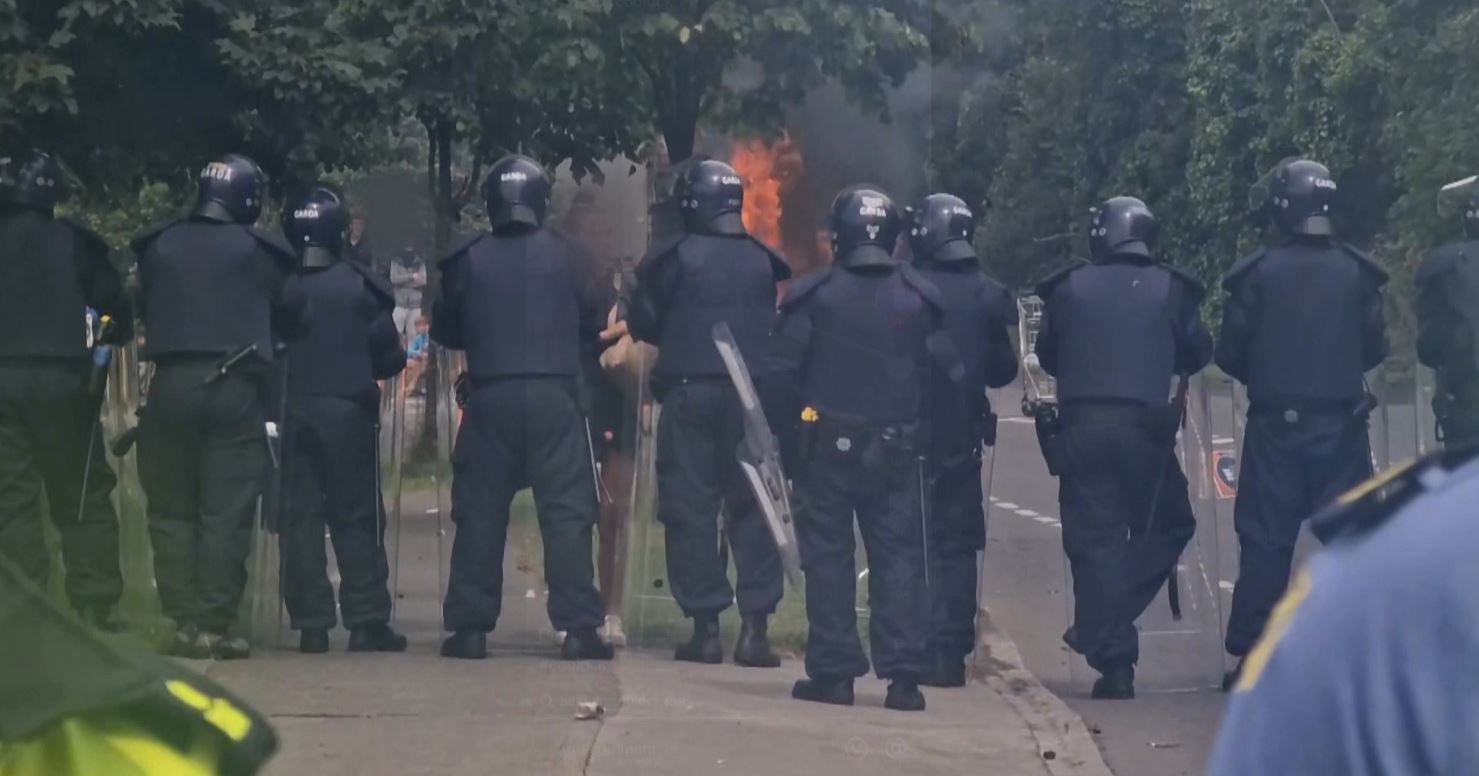RTÉ Investigates: Inside the Protests Captures Moment Coolock Site Attacked
For the past six months, Barry O’Kelly of RTÉ Investigates has been filming at protests against accommodation for migrants. The programme to be broadcast tonight features views from protesters, experts on policing and political movements, and individuals developing sites for accommodation. It documents how fierce opposition has developed at certain sites, and sometimes spun out of control.
At protests at several locations the programme documents people with genuine concerns about the availability of local services – for them, and asylum seekers – and others with more hardline outlooks.
On Monday 15 July, RTÉ Investigates was inside the former Crown Paints site in Coolock as one of the largest anti-immigration protests nationwide to date exploded into rioting. The site entrance had been blocked for more than 100 days by protesters, who had set up a camp with wooden huts, couches, fridges and storage areas.Footage from the early hours in the morning captured the events that unfolded over the subsequent hours, as protests turned ever more violent with pictures of fires and clashes circulated around the world.
The dramatic footage documents the racial abuse and intimidation of workers on the Coolock site and shows how the site was overcome with agitators with one security officer knocked unconscious.
One man told the security staff: “I’m going to find out where each and every one of youse live. Don’t think we won’t find you, cause we fking will. I’ve found worse c*s than you.”
Another man said: “You’ll get f**king shot here.” Making a gesture of a gun pointed to his head, he said: “Bang, bang. That’s what happens.”
The programme documents how the crowd at the entrance grew as the early morning wore on.“Go back to your country. The fences won’t hold you. Dublin says no. Get the f**k out, you’re a different breed.”
“Burn, baby burn,” one man chanted in what proved to be a prophetic comment as the cameras later captured the moment a petrol bomb was thrown on site.
The programme documents the security team and the staff at the Coolock site continuously calling the Gardaí looking for help as they were essentially under siege.

The cameras captured agitators – some armed with poles – roamed through the site, threatening and chasing after security workers, smashing windows, stealing beds, and most-visibly, setting fire to a digger. A member of the security team was hit in the head when a large pole was thrown in his direction. He was in and out of consciousness when paramedics arrived.
Outside the site entrance – hours after calls had first been made about the growing violence – the Garda public order units returned several hours after initially clearing the entrance to the site that morning. It was early evening before order was fully restored in the area.
In a statement to RTÉ Investigates, An Garda Síochána said the policing operation undertaken in Coolock, as with any event involving public disorder, was “centred on a graduated approach and a strong tradition of policing by consent”. It said over 200 members were deployed during the operation and a full investigation is now underway including the review of 3,000 hours of CCTV footage with 34 arrests having been made to date. It added three Gardaí were injured on the day.
Protests continued nightly over the following days. The site has been set on fire multiple times since. The developer of the site Paul Collins, spoke to RTÉ Investigates revealing that he left the country amidst fears for his safety and that of his family.
Mr Collins has already installed houses for asylum seekers elsewhere, but he says the opposition to his plan for the north Dublin site has been different.
“I’m not a guy that you easily frighten, but it’s definitely more frightening,” he said.
“I don’t understand in the sense of, you know, the hands on, the hands-off approach [by the Gardaí]. Is there a law or is there not?”
The former Crown Paints site is just one of 200 around the country designated for accommodating asylum applicants by the International Protection Accommodation Service (IPAS).
Some 400 people have been arriving weekly since February seeking international protection – almost double last year’s figure. This year alone, a total of 25,000 people are expected to make applications for asylum, bringing the total number since 2019 to 50,000.
With the growing numbers comes a growing demand for temporary accommodation and many local communities protesting their opposition to these being located in their communities for varying reasons.
Some experts have called for law and order reform to deal with the issue. However, others have warned the problems run deeper than that.
Dr Barry Cannon of the Department of Sociology in Maynooth University said, “I would resist reducing it to a public order element,”.
“There is a very large amount of people which feel very disenfranchised and cannot be ignored in this battle for hearts and minds.”
RTÉ Investigates- Inside the Protests, tonight at 9:35pm on RTÉ One and RTÉ Player
ENDS
Date: 19 September, 2024
Senior Communications Manager: Sharon Brady